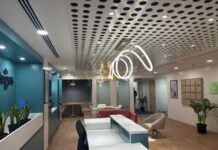New Delhi, July 03, 2020:
* What has been the impact of COVID-19 on your company?
Redbrick Offices runs enterprise coworking spaces. Coworking, by its name, implies collaborative working, so the sector has been impacted severely by COVID-19, as people are scared of being in collaborative / community spaces, unless those spaces are purely online as of now. At Redbrick, we build beautiful community and collaboration spaces, but we specialise in making private spaces/suites for our customers and have very little ‘open’ coworking and virtually no ‘hot-desking’, so we should be able to bounce back quickly once the lock-downs are lifted. The lock-down has been more detrimental than COVID-19, but the real impact of COVID-19 will only be visible once lock-downs are lifted, the impact will be felt on the macro/microeconomic level and the impact on our business will depend on how long it takes for general economic conditions to return to normal. For now, the lock-down has created some cashflow issues – but we are hoping these can be recovered post-lock-down.
* What is the estimated loss in business suffered a) by the coworking industry in India and b) your company in different cities c) your company in India so far?
I think all coworking spaces have suffered. The ones that have done very well during these challenging times, will probably still have taken a hit of 30% on the top-line, and I am certain that for many coworking spaces, this may have also been fatal. Without going into the details, I think we have probably been better off than most due to our higher enterprise client mix, but the Mumbai lock-down looks to continue and that will cause further losses in our business from our home city.
* How is your company planning to reinvent itself? Can you please talk about specific changes in detail?
Redbrick Offices was ahead of the curve w.r.t. Focusing on private and customised offices/suites – which has now been copied by many other players in the sector. This has been our saviour as it works best for more established SMEs, corporates and larger enterprises – which gives a certain degree of stability. However, going forward – there are certain changes we are looking to make in order to adjust for the new normal.
Short term measures are being put in place to deal with the immediate threat of COVID-19 to prevent its spread:
- Social distancing: We are taking measures to ensure social distancing is maintained at all times. This might include lowering density of seating in our offices, attendance monitoring to ensure only a certain percentage of teams are on-site, 50% capacity of meeting rooms, controlled access to common areas like washrooms, cafeterias and lounges – and use of technology to monitor and enforce these where possible.
- Touchless: We are installing touchless technologies to ensure infra-red scanning of temperature at every entrance, and touchless access to most rooms and ordering coffee/food from our in-house cafe’s using an app. Washrooms are being retro-fitted where required and touch-free sanitisation stations are being installed at regular intervals.
- PPE Equipment: Masks are mandatory and PPE equipment is available on request. We are installing highly visible communication campaigns across our sites to ensure our members are aware of all the COVID safety procedures and protocols, and what to do in case they don’t feel well. We are also going through extensive training of all our staff and contractors to ensure they are aware and follow all the safety procedures put in place.
In the longer term, we are thinking abou the future of the workspace, and how things might change. We are consulting with our clients to address their challenges and figuring out how to create workspaces that might work in the future, where a mix of remote and office work is going to be the norm. While the norm is still not set in stone, we are going ahead and adding extra meeting spaces, video conference equipment and more spaces where people can meet safely while following all COVID-safety norms.
* Are there international co-working space architectural models that the industry in India is referring to for inspiration? If so, which ones?
While we are following the guidance of International organisations like WHO and CDC, we must also cater to cultural and local factors – so we are taking cues from all over the world, localising the advice and applying it to our business scenarios to ensure a safe, hygienic workspace for all our members.
* Have clients—who are used to working out of such spaces—been calling? Any instances of feedback? Anything that they may be missing etc? Any memorable/funny instances?
Clients seem to be missing their workspaces, and that’s very encouraging for us. Not only is this positive feedback for our space designers, but also a validation of our belief that COVID-19 will not lead to a mass exodus of people from office spaces to work from home. The workspace has a purpose, and I strongly believe that coworking spaces like Redbrick Offices will thrive in the new normal. The flexibility, time-to-market and cost-effectiveness provided by the flexible workspace industry has been attractive as an alternative workspace strategy for some time – the COVID-19 crisis has surely and firmly pushed it from the alternative to a core strategy for commercial real estate owners and occupiers alike.
* Any specific incidental benefits of working out of co-working spaces that clients are missing out on at the moment? Any instances?
From my conversations with clients, the thing that people miss the most is the people. Their colleagues, their routines, their coffee breaks, walks after lunch etc. One of our clients really misses our chill zone at the Redbrick Pavillion centre in SenapatiBapat Marg in Pune. She sent me this picture – saying “she can’t to feel the morning sun on her face while working from this amazing spot.”
I often say, the office is not just a place – it’s an emotion. I think this incident captures that well.
* Do you see remote working becoming the future in Mumbai and how big a dent would this be in the business of co-working spaces?
I think remote working is already the present, and has been around for a long time. It’s been around since the mid-90’s when large companies like AT&T and IBM were trying out tele-commuting as a means to reduce office costs. It’s grown leaps and bounds since the Internet put the office in the palm of our hand. Even before COVID, there were organisations that were 100% remote, and many that weren’t still saw large sections of their offices empty as people worked remotely, from client sites, or were on the road. Coworking was invented to address this inefficiency – it was made for remote working. While the naysayers continue to predict a whole world, ‘working from home’, I think remote work will seldom be from home. It might be near home, or it might end up being more distribute – but most people will still want to go to a workspace, and businesses will look for flexible workspaces in Grade A buildings, with easy commutes and high quality amenities and safety/hygeine standards. That pretty much sounds like a Redbrick Office criteria for choosing its locations. So, I think while remote working is the future – coworking spaces are set to be the biggest beneficiary of this shift, especially in the enterprise segment in the medium term.
* How expensive would reinventing turn out to be?
Surely, it will be expensive. Operational costs are likely to increase significantly and landlords will also ask for higher common area charges. The re-invention is partly done for us, as we didn’t really play in the high-dense, hot-desking space which will be the most affected segment by COVID. But, retro-fitting, de-densification and additional equipment and investment in technology to achieve the highest standards of safety will surely take some percentage points off our margins.
* Any additional comments/data that you can share in this context are welcome
I think this is a tough time for commercial real estate in general, and coworking spaces as an industry. However, I think the impact will depend on the mix of your business – and the flex office operators that survive this crisis should see a great golden period ahead. The tough part is survival. However, it is also important to realise that the urge to go back to normal is balanced with due care and attention to the serious danger and threat posed by this disease. However long it takes, we must be patient and fight this together supporting each other as much as possible. We can only win this together, and sometimes it might mean sharing pain with clients or landlords – but we are all in this together. I look forward to when this is all over, and we rebuild to a new normal, hopefully a better normal than before.
Corporate Comm India (CCI Newswire)



















